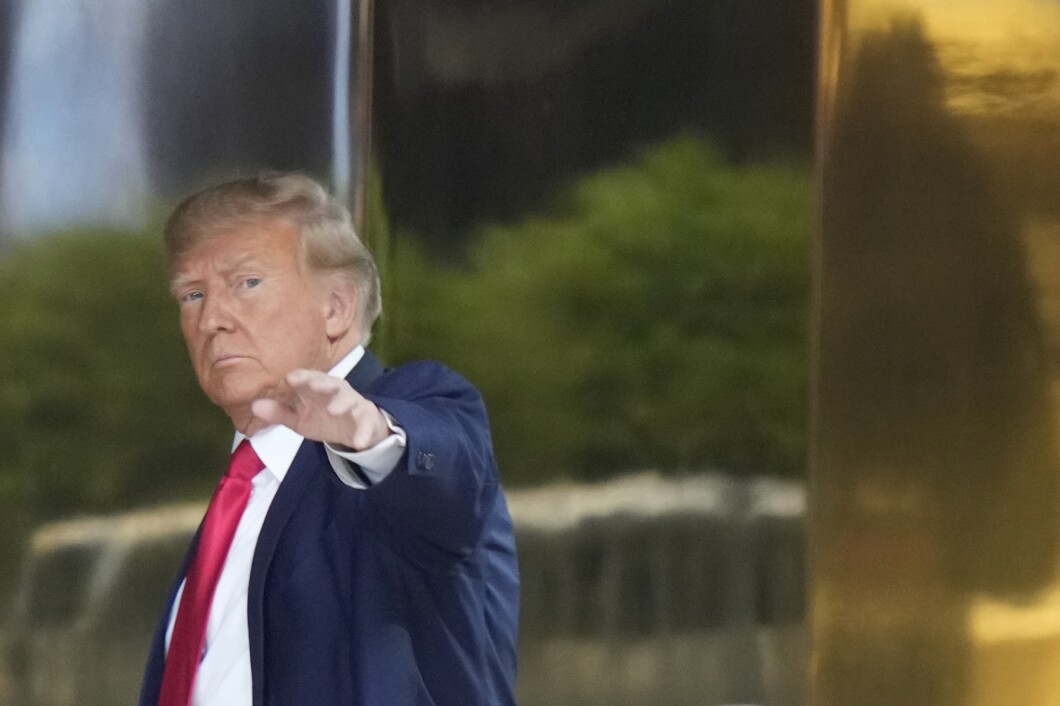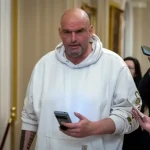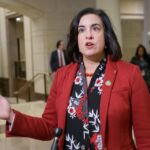
Former President Donald Trump faced an unprecedented indictment in New York criminal court Tuesday afternoon as the public was finally informed of the charges Manhattan District Attorney Alvin Bragg is levying against the 45th president.
The indictment consists of 34 felony charges of falsifying business records in the first degree. Trump is accused of paying hush money to porn star Stormy Daniels, Playboy model Karen McDougal, and a former Trump Tower doorman who’d claimed to know a story about a child Trump allegedly had out of wedlock.
DONALD TRUMP ARREST: READ THE FULL INDICTMENT IN THE HISTORIC CASE AGAINST THE FORMER PRESIDENT

Bragg’s office is alleging the falsification of those records ties into Trump’s alleged political efforts to save face ahead of his 2016 presidential announcement.
“When you see the doorman payment, the McDougal payment, and the Stormy Daniels payment, you realize this is effectively a conspiracy that’s being alleged,” Scott Tenley, a former federal prosecutor and partner at Zweiback, Fiset & Zalduendo, told the Washington Examiner on Tuesday.
But legal experts have said there’s no precedent for prosecutors to combine the falsifying business records charge with a violation of state election law in a case involving a presidential election or any federal campaign for that matter.
“It is incredibly difficult to show that the payments were for election purposes rather than for other purposes,” Michael O’Neill, assistant general counsel at Landmark Legal Foundation, told the Washington Examiner last month.
Daniels’s representatives contacted the National Enquirer to offer exclusive rights to her story about an alleged affair with Trump. David Pecker, the tabloid’s publisher and an ally of Trump, agreed to scope out damaging stories about him during the 2016 campaign, later agreeing to purchase the story of another woman’s affair with Trump and never publish it, described by Bragg’s office as “catch and kill.”
Pecker ultimately did not purchase Daniels’s story. Pecker and the tabloid’s lead editor, Dylan Howard, assisted in brokering a separate deal between Trump’s ex-attorney Michael Cohen and Daniels’s attorney.
Cohen paid $130,000 from his own funds, and the Trump Organization later reimbursed him while Trump was a sitting president, citing Cohen’s payment as a “monthly retainer” for his legal work.
According to Bragg’s investigation, it revealed Pecker’s alliance with Trump continued through the 2016 election and the former president’s inauguration. The investigation revealed that after Pecker’s help, he was invited to the inauguration and later a dinner at the White House in 2017.
The grand jury heard testimony from various witnesses since it was formed in January, including two appearances by Pecker.
“If you look at the statement of facts, there’s some really damning information that clearly came from Pecker, which is an agreement to engage in the ‘catch and kill’ to help Trump’s campaign,” Tenley said.
Jared Carter, a professor at Vermont Law School, told the Washington Examiner on Tuesday that “it’s the prosecutor’s burden to prove the case,” noting that “demonstrating intent” by Trump is the crux of getting a conviction.
Legal experts have also pointed out several potential holes that could make Bragg’s case a steep uphill battle to convict the former president. For one, Cohen is not considered a strong possible witness given his credibility is open to challenge since he pleaded guilty in 2018 to nine felonies and was sentenced to three years in federal prison.
Since the case against Trump also ties back to 2016 and 2017, legal experts have suggested it may fall outside the range of the statute of limitations. Trump’s legal team will likely attempt any effort to dismiss the case, and Trump is not expected to be back in court until December.
“I mean, it’s worse than a zombie case,” former Harvard Law professor Alan Dershowitz previously told the Washington Examiner. “Zombies were once alive. This case never had any life to it — made up from the very beginning, and it’s also a clear violation of the statute of limitations.”
There could be some exceptions to the five-year deadline, such as the fact that Trump was previously in the Oval Office and if the person being charged was living out of state.
Responding to several questions at a Tuesday afternoon press conference about why Bragg decided to bring the case now, the district attorney said it was because the evidence in the case was “ready.”
“Under New York State law, it is a felony to falsify business records with intent to defraud, and an intent to conceal another crime. That is exactly what this case is about,” Bragg added.
Meanwhile, Trump’s legal team entered a not guilty plea Tuesday and previously indicated that they plan to make “a lot of motions” once they see the indictment, attorney Joe Tacopina said last week.
“I don’t think this case is going to see a jury. I think it’s going to go away on papers,” Tacopina said. “I think there’s a legal challenge that will be made and should be made successfully.”
Tacopina has even referenced the case of two-time Democratic presidential candidate John Edwards and his federal indictment as an example that underlines his view that Bragg posits a flimsy case. Edwards was charged with soliciting nearly $1 million from wealthy donors to hide an affair.
Although he ultimately admitted to the affair, which contrasts with Trump’s denial of an affair with Daniels, Edwards was acquitted by a jury in 2012 that found him not guilty of one count of receiving illegal campaign donations and deadlocked on five other charges, which the Justice Department subsequently dropped.
CLICK HERE TO READ MORE FROM THE WASHINGTON EXAMINER
Carter predicted that Trump will likely continue his “scorched earth” legal strategy to “slow things down.”
“And clearly, the president is trying to take political advantage of this case. And so in some ways, the longer this drags on, you know, the better for him,” Carter added.





